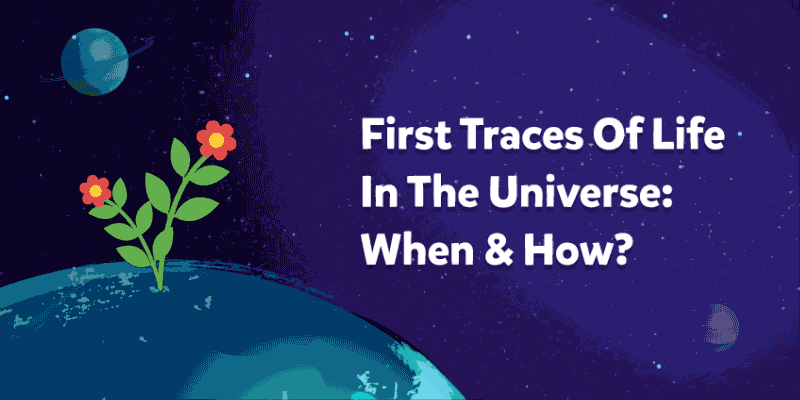
Wander off, look around you, observe anywhere on Earth and there is life! Whether it’s a bird perching on a tree, a dog running around in the park or the invisible microorganisms inhabiting every surface. However, when the planet was born 4.5 billion years ago, it was sterile. So, when and how did the first life emerge?
The short and simple answer would be: we don’t know exactly, because if humankind knew when and how, we could reproduce it. Scientists and experts could then put the right chemicals in a sealed container under the perfect conditions and when they opened it, they would find living organisms! Well, nobody has ever done this and it has not yet been possible. However, we do have a lot of clues as to how and when life might have begun in the universe. Let’s begin with the easiest of them all.
As many as 123 definitions of life have been compiled until now by scientists. The definition of life is also somewhat disagreed upon by biology textbooks. Popular Science writer and American ethologist James Gould writes that “most dictionaries define life as the property that distinguishes the living from the dead, and define dead as being deprived of life. These singularly circular and unsatisfactory definitions give us no clue to what we have in common with protozoans and plants.”
Famous Biology book writers Neil Campbell and Jane Reece state that “the phenomenon we call life defies a simple, one-sentence definition.” While author John Casti gives a single-sentence definition: “an entity is considered to be ‘alive’ if it has the capacity to carry out three basic functional activities: metabolism, self-repair, and replication”. NASA defines life as “a self-sustaining chemical system capable of Darwinian evolution.”
Now let’s move on to what life is made of and where did those components come from? Living organisms present on Earth contain thousands of chemicals such as proteins and nucleic acids that carry our genetic information. These chemicals are quite complex, but it has been found that their constituent parts form quite readily. Several studies have later discovered that the Earth was a factory of biological chemicals. However, having lots of these chemicals doesn’t necessarily yield life.
This is where it all gets tricky. According to research, it boils down to three things when it comes to something being alive. First, the organism has to keep itself together, often with an outer layer, the removal of which is immediately problematic. Second, the organism must feed itself and this involves complex chemical reactions. And finally, life has to reproduce itself, which means it must have genes it can pass on.

The first idea that scientists could think of when asked the most profound question of how life began was that of the “primordial soup”. The notion was that when the Earth was young, the oceans were filled with simple chemicals important for life. These would eventually self-assemble into simple living cells. This idea was proposed in the 1920s by two researchers working independently: Alexander Oparin in the USSR and British geneticist JBS Haldane.
This idea received massive support in 1953 when a young American graduate student named Stanley Miller, supervised by Nobel Prize winner Harold Urey, conducted a famous experiment. Miller mixed four simple chemicals in glass tubes, which were heated and shocked with electrical sparks to mimic lightning. The experiment made several amino acids, the building blocks of proteins. And this experiment showed the world that the chemicals of life could form naturally.
However, as we already mentioned above, making life from scratch has proved to be a lot more complicated than what Miller’s experiment suggested. Scientists, even today disagree about which chemical components of life came first, which of life’s processes came first, and where on Earth life first arose.
A more popular school of thought stated that life began with RNA, a close relative of DNA, in an “RNA World”. RNA can carry genes and copy itself just like DNA, but it can also fold up and act as an enzyme, just like a protein. The idea opined by experts was that organisms based solely on RNA arose first, and only later developed DNA and protein. However, in recent years, some researchers have suggested that RNA only really reaches its potential when it is paired with proteins and that both must have existed for life to get started. Another opinion states that the first organisms were simple blobs or bubbles.

What scientists have been sure of is the time when the oldest fossil evidence was found. Scientists have discovered that life began at least 3.5 billion years ago in the universe because that is the age of the oldest rocks with fossil evidence of life on Earth. These 3.5 billion-year-old rocks with fossils can be found in Africa and Australia. Chemical traces of life have also been detected by experts in slightly older rocks. For instance, in Greenland, a series of ancient metamorphosed sediments have been found. Research has indicated that the sediments were deposited about 3.8 billion years ago.
Overall, life as we understand it must have water. This general rule is true on Earth and is thought to be true elsewhere as well in our solar system. Currently, life is being sought on the planet Mars where water may have once flowed on the surface.
Do you think life can exist in conditions completely different from the Earth’s? What do you think is the secret ingredient to make life possible? Tell us in the comments below.
Enjoyed reading this? Check out more cool stuff on the Learning Tree blog.
Writing has always been Shreesha’s passion, be it for imparting knowledge or expressing opinions. In her former role as a journalist, she contributed to enriching society with knowledge. Now, at BYJU’S, she has moved on to something more exciting – creating tailor-made content for students. When she is not writing, you would find her looking for new ways to engage her child.